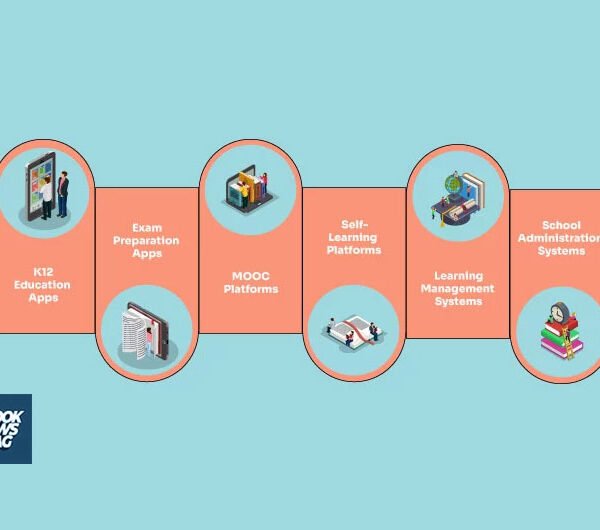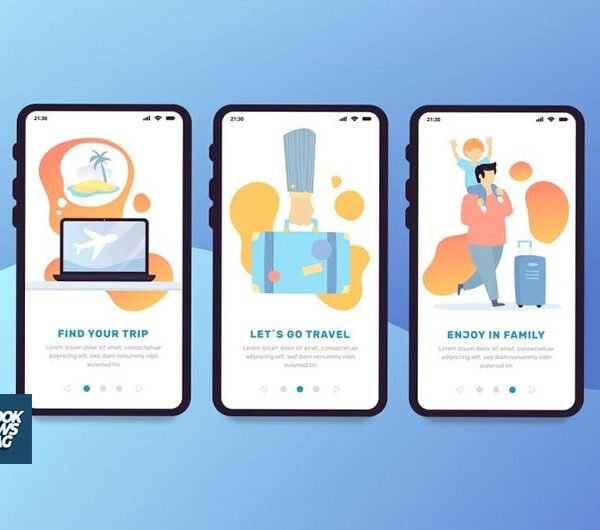The Future of Apps: Emerging Trends and Technologies Shaping the App Industry
Mobile applications, or apps, have become an integral part of our daily lives. We use apps for everything from communication, shopping, banking, navigation to entertainment. As of 2022, there were over 5 million apps available for download on the Google Play Store and Apple App Store combined. The app industry is booming and does not show any signs of slowing down.
With advancements in technology and changing consumer preferences, the app industry is dynamically evolving. New trends are emerging while current ones are being redefined. Understanding these trends is crucial for developers and businesses trying to succeed in the increasingly competitive app market.
This article explores the key technologies and trends that will drive innovation in the app industry over the next five to ten years. It provides actionable insights into how apps are expected to progress and equip developers, marketers and businesses to future-proof their app strategy.
A mobile application, commonly referred to as an app, is software designed to run on smartphones, tablets and other mobile devices. Apps allow users to perform various functions and access information quickly.
The app industry has witnessed explosive growth over the last decade. As per App Annie’s estimates, consumer spending on apps reached $170 billion in 2021, showing an increase of 19% from 2020. It is further expected to grow to $270 billion by 2025.
With such tremendous growth, the app industry is constantly evolving. New technologies and innovations are reshaping apps and redefining interaction models. Understanding key trends is imperative for developers and businesses trying to succeed with their apps.
This article will provide an in-depth look at leading trends and technologies that will drive innovation in the app industry over the next five to ten years. It covers crucial aspects like development frameworks, user experience, monetization models, security, and emerging tech integration in apps to paint a holistic picture of where the industry is headed.
Current State of the App Industry
Before diving into the trends shaping app development, let us look at some key stats highlighting the current state of the industry.
i. Rapidly Growing App Market
- As per Data AI’s State of the App Economy report, the app industry is now worth $1.8 trillion.
- Over 230 billion apps were downloaded in 2021 alone.
- Mobile app revenue is projected to reach $935 billion by 2023.
- Consumers spend 90% of their mobile time in apps versus mobile websites.
ii. Dominant App Categories
- Games continue to dominate app store downloads at over 10% share. Hyper-casual games are gaining strong momentum.
- Business is the second most popular app category, followed by education, lifestyle and utility apps.
- Health & fitness apps saw over 70% increase in first-time downloads from pre-pandemic levels.
iii. Notable App Market Players
The app stores and platforms play a key role in the discovery and distribution of apps.
- Apple App Store and Google Play Store continue to lead in terms of number of apps and total downloads.
- Third-party Android app stores are gaining adoption, especially in developing markets.
- App marketplaces like Shopify App Store and Salesforce AppExchange are Popular channels for business apps.
Emerging Trends in App Development
Rapid advancements in technology and shifts in consumer behavior are introducing new trends in app development. Here are some of the most notable ones expected to shape apps of the future.
i. Leveraging 5G Connectivity
The rollout of 5G networks opens new possibilities for app innovation. With enhanced connectivity speeds, developers can build more advanced app capabilities.
Some areas where 5G will influence apps:
- Real-time video streaming
- Augmented reality experiences
- Multiplayer cloud gaming
- Connected vehicle applications
App developers must optimize apps to fully utilize 5G connectivity through compressed video formats, dynamic resource scaling, etc.
ii. Integrating AR and VR Capabilities
Immersive technologies like Augmented Reality (AR) and Virtual Reality (VR) are making their way into apps across categories.
- Retail apps allow users to virtually try on products using AR. Eg. IKEA Place, Sephora
- Apps offer engaging AR gaming experiences like Pokémon GO.
- VR meditation and fitness apps are gaining popularity. Eg. TRIPP, FitXR
Advancements in ARKit and integration of LiDAR & depth sensing cameras in devices will drive more innovative usage of AR/VR in apps.
iii. Incorporating AI and ML
Artificial Intelligence (AI) and Machine Learning (ML) are already widely used in apps for automation, personalization, analytics and more.
Some examples:
- Predictive keyboards in messaging apps like Gboard, SwiftKey
- Personalized recommendations in shopping apps
- Automated photo tagging and smart albums in Google Photos
- AI-powered chatbots helping customers in banking apps
More apps will leverage capabilities like natural language processing, computer vision and robust recommendation engines powered by AI/ML advancements.
User Experience and User Interface Innovations
The success of an app heavily depends on offering engaging user experience (UX) catered to customers’ needs and priorities. Recent trends reflect a strong user-centric approach to app design.
i. Personalized and Contextual Experiences
Modern apps can dynamically adapt to users based on their individual preferences and real-world context such as location, time, activity, etc.
Strategies for personalization:
- Predictive content suggestions based on user interest
- Location-based notifications and recommendations
- Custom homescreen widgets and notification settings
- Context-aware features using device sensors
Personalization drives higher engagement and satisfaction. Eg. Instagram, YouTube, Netflix and other leading apps use these techniques extensively.
ii. Conversational User Interfaces
Conversational interfaces like chatbots and voice assistants are transforming interactions in apps across domains.
Benefits include:
- Intuitive hands-free usage with voice commands
- 24/7 availability of chatbots to assist users
- Ability to process natural conversations and multi-turn dialogs
Use cases:
- Voice assistants like Siri, Alexa integrated into third-party apps
- Customer support chatbots in finance, commerce and workplace apps
Advancements in NLP along with contextual data will enable more human-like conversations with apps.
iii. Inclusive and Accessible Design
There is a growing emphasis on meeting the diverse needs of every app user irrespective of disability, language skills or age-group.
Strategies for inclusive design:
- Support for assistive tools like screen readers
- Captioning for audio/video content
- Options to customize text size, color contrast
- Simple layouts and clear navigation
Besides better compliance with accessibility regulations, inclusive design can expand an app’s target audience and boost growth.
App Security and Privacy
With increasing cyber threats and stringent data privacy regulations, security and privacy have become critical considerations during app design and development today.
i. Addressing Security Vulnerabilities
- App stores like Google Play require security testing and vulnerability analysis before publishing apps.
- Data encryption, credential management, regular updates and patches help mitigate risks.
- Tools like antivirus software, firewalls, intruder detection systems boost app security.
Developers need to embed security early into the SDLC following best practices like DevSecOps.
ii. Strengthening Data Privacy
Users expect transparency and control over their data shared with apps. Steps taken by developers:
- Implementing minimum data collection policies
- Providing granular permissions and opt-in consent
- Clearly communicating usage of sensitive data
Stricter data protection laws like GDPR in the EU necessitate these measures.
iii. Leveraging Blockchain for Security
Blockchain shows promise for enhancing app security by decentralizing data storage and establishing trust.
Benefits:
- Tamper-proof data records
- Reduced data theft risks via distributed ledgers
- No single point of failure
Healthcare apps use blockchain to store patient data securely. However, mass adoption requires more scalable blockchain platforms.
App Monetization Trends
Monetization models on apps continue to evolve from one-time paid downloads to diversified business models.
i. Recurring Revenue With Subscriptions
The subscription model is gaining significant traction across app categories.
Benefits include:
- Steady revenue stream
- Higher customer lifetime value
- Lower user acquisition costs
Eg. media apps like Spotify and productivity apps like Evernote leverage subscriptions.
Specialized payment platforms like RevenueCat allow easier management and optimization of complex subscription models.
ii. Strategic In-App Advertising
In-app advertising remains a sizable monetization stream despite user antipathy towards disruptive ads.
Effective tactics:
- Contextual and personalized ad placement
- Rewarded video ads that provide incentives to users
- Leveraging native ads that blend with the app UI
Ad upgrades to targeted 5G advertising with lower latency and higher customization based on user preference.
iii. User Data Monetization
While users enjoy free access to many apps, their data is often monetized by developers.
Common approaches include:
- Analyzing user behavior to optimize app design and drive premium subscriptions
- Selling anonymized datasets to third parties for targeted advertising
- Building proprietary recommendation engines using aggregated user data
However, growing privacy concerns are necessitating developers to be transparent about data collection policies and allow users more control. Regulations like GDPR also enforce higher compliance standards.
As a result, new privacy-focused monetization models are emerging:
- Data marketplaces like DataStream allow users to directly sell their data
- Tools like Solid allow users to control apps’ data access
By putting users at the center of data monetization, apps can build trust and loyalty.
The Role of IoT in App Innovation
The Internet of Things (IoT) is bringing software intelligence into devices, home appliances, wearables and cars. This is enabling innovative IoT-focused apps and services.
i. Apps Controlling Connected Devices
Smart home apps from Google Nest, Amazon Alexa and Apple HomeKit allow monitoring and operating IoT appliances like lights, AC, security systems from mobile devices.
Wearable companion apps fetch quantified health data from IoT fitness trackers and smartwatches to offer personalized insights.
Such control apps will become far more advanced leveraging new connectivity protocols like 5G and Matter.
ii. Data-Driven IoT Apps
By gathering sensor data from IoT ecosystems, developers can train machine learning models to build intelligent apps.
Use cases:
- Predictive maintenance apps for industrial equipment
- Driver safety and vehicle health monitoring apps in connected cars
As IoT expands, such data-driven IoT apps will grow, powered by AI/ML advancements.
iii. Opportunities and Challenges
While IoT offers growth opportunities for many categories of apps, some key challenges need addressing:
- Ensuring interoperability across many device types
- Handling scale and security considering data generated from millions of sensors
- Achieving reliability of apps dependent on uptime of devices/sensors
- Designing user-friendly interfaces for data complexity
Companies like Microsoft, PTC and Samsara offer robust IoT app development platforms. Best practices around scalable cloud architecture, smart analytics and responsible AI will shape the maturity of IoT apps.
Cross-platform App Development Gaining Prominence
Developing distinctly native apps for iOS and Android leads to duplicated efforts for developers. This is driving adoption of cross-platform development and progressive web apps.
i. The Rise of Progressive Web Apps
PWAs deliver an app-like user experience via the mobile web browser. Key benefits:
- One codebase across platforms using web languages like JavaScript, HTML, CSS
- Lightweight and faster loading than native apps
- Easy integration of features like push notifications, offline usage, device hardware access
Categories like e-commerce, media, workplace apps use PWAs to lower costs and maximize reach.
ii. Cross-platform Frameworks
Frameworks like React Native, Flutter and Xamarin allow building for both iOS and Android from a single codebase.
Advantages include:
- Faster time-to-market with up to 50% reduced engineering effort
- Uniform UX across platforms with platform-specific UI elements
- Code reuse across platforms and UI components
- Hot Reloading to view changes instantly during development
Leading apps like Uber, Facebook, eBay use cross-platform frameworks extensively.
iii. Evaluating Tradeoffs
Developers need to evaluate factors like app capability needs, user experience requirements, release frequency, and time-to-market to decide between native, cross-platform or progressive web.
While native development skills continue to be relevant, cross-platform skills will provide flexibility. PWAs suit apps not needing advanced device access. But for game development, native languages still dominate.
App Store Optimization and Discovery
App store discoverability remains crucial for adoption. Optimizing visibility by tailoring apps to store algorithms is imperative.
i. App Store Optimization Strategies
App Store Optimization (ASO) focuses on improving app visibility in search results and charts of app stores.
ASO best practices:
- Keyword optimization in title, description, screenshots
- Localization into relevant languages
- Leveraging videos to showcase UX
- Building ratings and reviews
Continuous A/B testing of elements to drive installs
ii. Decoding Store Algorithms
Factors considered by app store algorithms:
- Install velocity: #installs over time
- Retention: Churn/uninstallation rate
- User feedback: Ratings and reviews
Keeping core metrics like crash rates, adoption funnel and MAU stable also boosts rankings.
iii. Emerging App Discovery Channels
While app store search remains vital, additional discovery sources gain relevance:
- App referrals via social sharing or messaging
- Integration with virtual assistants like Alexa
- Preloaded apps on mobile devices
- App bundles and subscription services
Developers need a unified measurement strategy across app referral channels.
Promoting Ethical and Sustainable Design
There is a growing emphasis on ethics and sustainability in app design for fostering responsible innovation and ensuring environmental accountability.
i. Committing to Ethical Practices
Apps collect vast amounts of sensitive user data that needs responsible usage as per these principles:
- Transparency on data collection policies
- Seeking informed user consent
- Anonymizing collected data before processing
- Rights for users to access and delete data
- Ensuring privacy and security
Eg. NHS COVID-19 app follows stringent standards around transparency, privacy and user control over data.
ii. Minimizing Environmental Impact
Factors adding to the carbon footprint of apps:
- App size and mobility data transmission
- Powering cloud-based infra for apps
- Electronic waste from discarded devices
Strategies promoting sustainability:
- Optimizing data payloads
- Following green software development practices
- Informing users to upgrade devices less frequently
iii. Promoting Social Good
Apps directly support causes like health, education, gender equality, financial inclusion of underprivileged groups and environmental conservation. Like:
- India’s myGov app provides access to essential services
- Forest app lets users grow real trees via subscriptions
- LaLiga app developed new football turf with recycled tires
Conclusion
In closing, here is a summary of crucial aspects discussed in this article around the future of mobile apps:
- 5G networks will expand the capabilities of real-time, interactive apps with high data processing needs.
- Immersive technologies like AR, VR and conversational interfaces will drive engaging new interaction models.
- AI/ML integration will make apps smarter, extremely personalized and contextually relevant.
- While native app development skills continue to be relevant, cross-platform skills will provide flexibility.
- App distribution and monetization models will continue to evolve with subscriptions and regulated data monetization gaining prominence.
- Integration with disruptive IoT ecosystems will enable next-gen apps leveraging connected sensors and devices.
- For scaling reach across platforms, accelerated development and maximizing distribution, PWAs warrant evaluation.
- Persistent app store optimization and leveraging emerging discovery channels will be key for visibility.
- There will be greater accountability around embedding ethical principles and lowering environmental impact in apps.
By keeping up-to-date with these industry trends, developers and businesses can take more informed strategy decisions and build future-ready apps matching evolving consumer needs. Apps products fundamentally improving lives will sustain competitive advantage.









